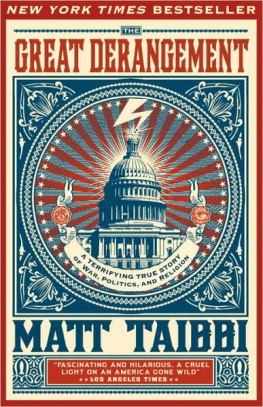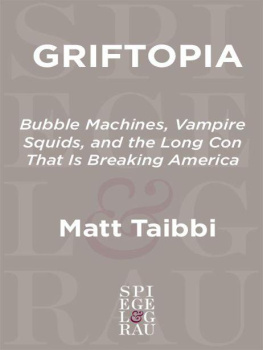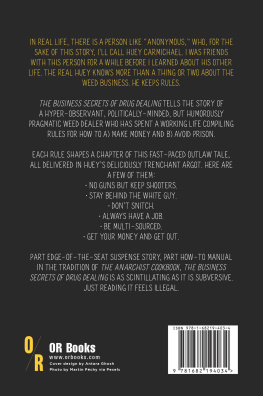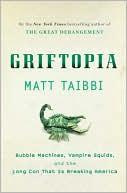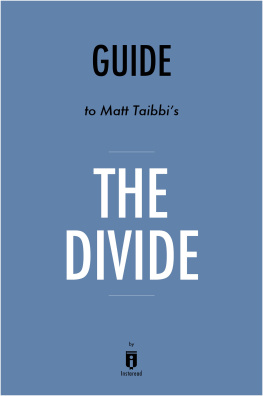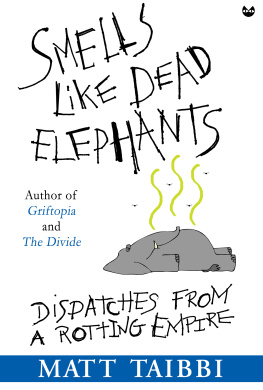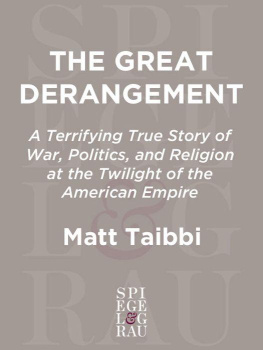Matt Taibbi - Hate Inc.
Here you can read online Matt Taibbi - Hate Inc. full text of the book (entire story) in english for free. Download pdf and epub, get meaning, cover and reviews about this ebook. year: 2019, publisher: OR Books, genre: Politics. Description of the work, (preface) as well as reviews are available. Best literature library LitArk.com created for fans of good reading and offers a wide selection of genres:
Romance novel
Science fiction
Adventure
Detective
Science
History
Home and family
Prose
Art
Politics
Computer
Non-fiction
Religion
Business
Children
Humor
Choose a favorite category and find really read worthwhile books. Enjoy immersion in the world of imagination, feel the emotions of the characters or learn something new for yourself, make an fascinating discovery.

- Book:Hate Inc.
- Author:
- Publisher:OR Books
- Genre:
- Year:2019
- Rating:4 / 5
- Favourites:Add to favourites
- Your mark:
- 80
- 1
- 2
- 3
- 4
- 5
Hate Inc.: summary, description and annotation
We offer to read an annotation, description, summary or preface (depends on what the author of the book "Hate Inc." wrote himself). If you haven't found the necessary information about the book — write in the comments, we will try to find it.
Hate Inc. — read online for free the complete book (whole text) full work
Below is the text of the book, divided by pages. System saving the place of the last page read, allows you to conveniently read the book "Hate Inc." online for free, without having to search again every time where you left off. Put a bookmark, and you can go to the page where you finished reading at any time.
Font size:
Interval:
Bookmark:
Contents
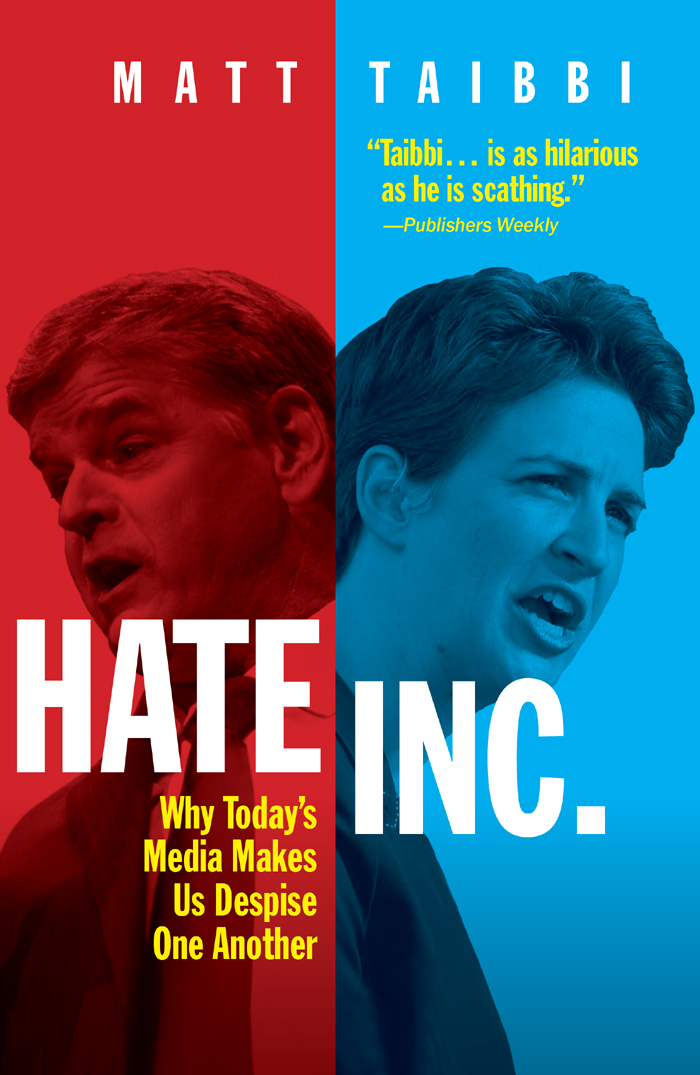


2019 Matt Taibbi
All rights information:
First printing 2019
All rights reserved. No part of this book may be reproduced or transmitted in any form or by any means, electronic or mechanical, including photocopy, recording, or any information storage retrieval system, without permission in writing from the publisher, except brief passages for review purposes.
Cataloging-in-Publication data is available from the Library of Congress.
A catalog record for this book is available from the British Library.
Typeset by Lapiz Digital Services.
Published for the book trade by OR Books in partnership with Counterpoint Press.
ISBN 978-1-949017-25-0 hardcover
ISBN 978-1-949017-26-7 e-book
10 9 8 7 6 5 4 3 2 1
CONTENTS
N ormally, an author doesnt tell you about the changes made along the way to a completed book.
In this case I have to, because this book was originally published online, in serial form, at a still-existing site for subscribers: Taibbi.Substack.Com. Those subscribers know Hate Inc. was originally called The Fairway, and that I changed my mind about the title midway through the book.
It wasnt the only change. Originally, this book was intended to be a re-thinking of the classic work of media criticism by Edward Herman and Noam Chomsky, Manufacturing Consent. In fact, the original title of the book was going to be Manufacturing Discontent.
Ive carried three books with me everywhere throughout my travels over the years (Ive traveled a lot in my career as a reporter, living as far away as Mongolia and Uzbekistan). Those were Fear and Loathing: On the Campaign Trail 72 by Hunter S. Thompson, Scoop by Evelyn Waugh, and Manufacturing Consent.
Roughly speaking, the first book by Thompson is a great work of journalism, the second, Scoop, is the perfect parody of journalism, and Manufacturing Consent is an academic warning to reporters like myself, describing all the ways in which journalism can be counterproductive, serve power, and generally fail.
My original idea was to reconfigure that warning to reporters of my generation, who have far different professional and financial pressures than the ones Chomsky and Herman wrote about in the seventies and eighties.
As I was surprised to learn in the course of interviewing him for this book, Chomsky knew quite a few reporters, and this informed his work. But neither he nor Edward Herman (whose idea it was to write a media-themed book) ever worked in a newsroom, or sat down to write a lede with a deadline twenty minutes off.
I wanted to stress the personal experience I had. But when I sat down to write what Id hoped would be something with the intellectual gravitas of Manufacturing Consent, I found decades of more mundane frustrations pouring out onto the page, obliterating a clinical examination.
The book quickly became more confessional than academic study. Its about the invisible pressures of the business Ive been in for nearly thirty years now. Commercial media has always been sensationalistic. We were never not encouraged to aim content at your outrage center. We were always eyeball-hunting.
I know this because I was hired to do this work, over and over. My commercial niche, in fact, was the vitriolic essay that got people spitting mad, or poked fun at someone audiences hated.
I was the Triumph the Insult Comic Dog of journalism. I actually won the National Magazine Award for commentary, the highest award you can get in the magazine business, for a Rolling Stone article about Mike Huckabee called My Favorite Nut Job that called the Arkansas governor a Christian goofball of the highest order who resembled an oversized Muppet. There is and was great demand in the business for takedown artists, provided youre taking down the right people.
I never wanted to be a reporter. My heroes were comic novelists, and I believed what Hunter S. Thompson once said, that the best fiction is truer than any journalism. The career I wanted was one producing books that did nothing but provide enjoyment, books that were like close friends you could lean onwhat Raymond Chandlers books have meant to me.
But I turned out to be a terrible fiction writer, and defaulted to this work. I always had an uncomfortable relationship with the business, and at some point I made nearly all of the mistakes youll read about in this book.
In fact, part of what started to pour out when I wrote these chapters was the self-loathing that came with knowing Id tossed so much red meat to political audiences. Getting plaudits from liberal audiences for writing splenetic features about Mike Huckabee or Fred Thompson or Michelle Bachmann is like a comedian doing a routine in front of a bunch of potsmokersyou cant tell if the laughs are real.
More to the point, after eight years of writing about the financial services industry in the wake of the 2008 crash, I was more and more tuned into the idea that partisan politics is a bit of a con. A lot of very serious social problems (like the failure to stop mass fraud in the mortgage markets) have completely bipartisan roots, but in the press we regularly sell people on a simplified image of politics, of two parties in complete conflict about everything. If one of those sides was yours, you seldom saw it besmirched by criticism.
Did I have a part in that? There was an undeniable gravitational pull toward the Red v. Blue narrative, and I wrote mainly for Blue audiences. But at the reporting level, once you got into the weeds of almost any serious issue it always seemed a lot more complicated: military contracting corruption, money laundering, campaign finance fraud, financial deregulation, torture, drone assassination, you name it.
I started to believe we keep people away from the complexities of these issues, by creating distinct audiences of party zealots who drink in more and more intense legends about one another. We started to turn the ongoing narrative of the news into something like a religious contract, in which the idea was not just to make you mad, but to keep you mad, whipped up in a state of devotional anger. Even in what conservatives would call the liberal media, we used blunt signals to create audience solidarity. We started to employ anti-intellectualism on a scale Id never seen before, and it ran through much of the available content.
Once, a reporter could work his or her whole life without really being a known quantity to audiences. The rare exception was someone like Thompson, who made his darkest inner dialogues part of the story. As his Rolling Stone colleague Tim Crouse noted in the campaign diary The Boys on the Bus, Thompson was alone among reporters in not having to explain to his spouse what the trail was like when he got home. She already knew from reading his articles. Even his most private asides were in print.
But everybody else in the business got to keep his or her personal character private to a degree. Insofar as you picked a team, your team was the press, an entity separate from either party, with its own power and own institutional concerns.
A generation ago, you would never have seen members of the media arguing for enhanced censorship powers and media regulation, as weve seen in the last year or so, in the controversy surrounding fake news. You also wouldnt have seen so many members of the press so openly invested in political outcomes.
Next pageFont size:
Interval:
Bookmark:
Similar books «Hate Inc.»
Look at similar books to Hate Inc.. We have selected literature similar in name and meaning in the hope of providing readers with more options to find new, interesting, not yet read works.
Discussion, reviews of the book Hate Inc. and just readers' own opinions. Leave your comments, write what you think about the work, its meaning or the main characters. Specify what exactly you liked and what you didn't like, and why you think so.

